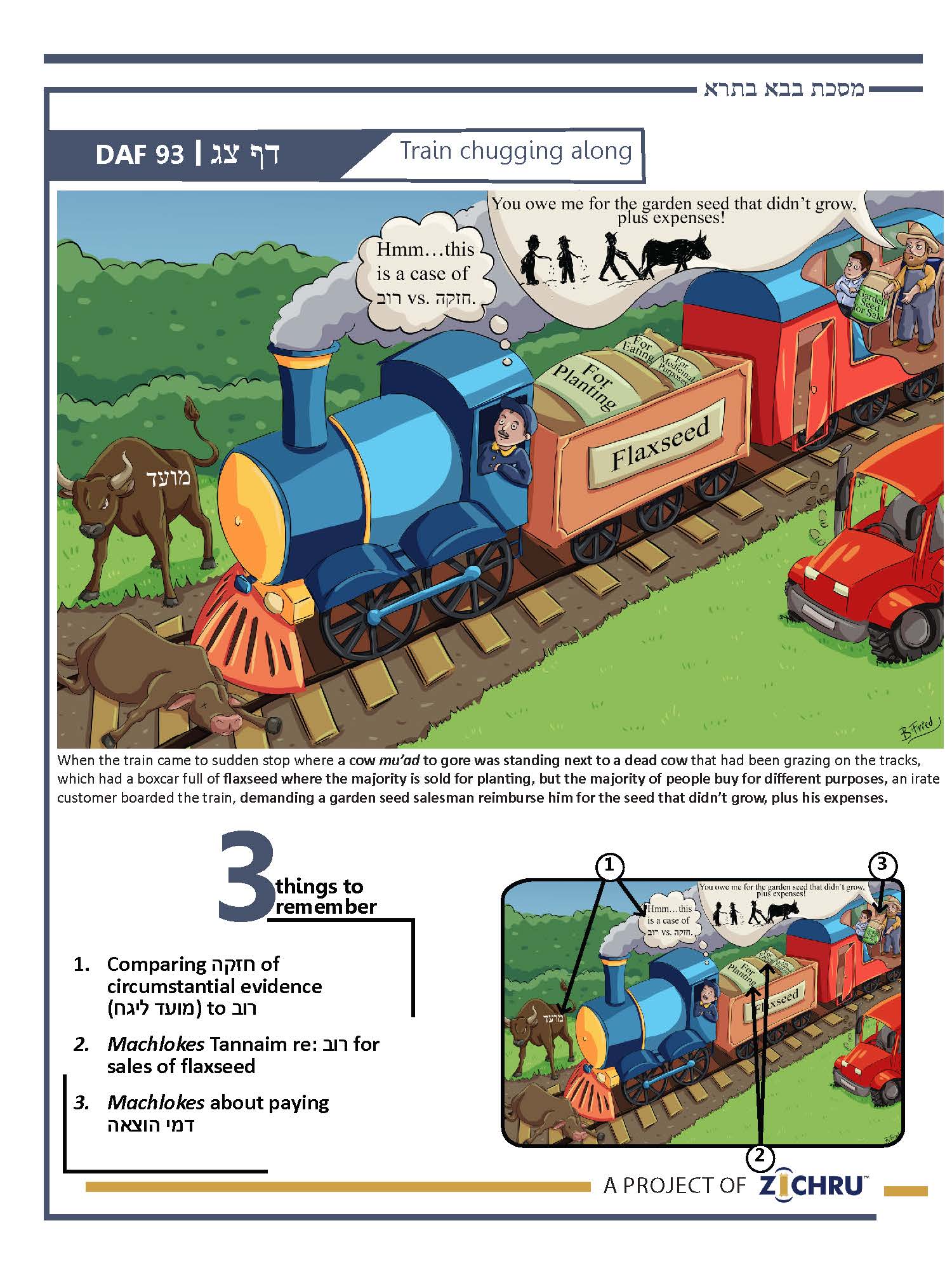Bava Basra - Daf 93
- Audio Timestamps
0:00 - The 3 Sugyos
2:24 - Review of 3 Sugyos
4:43- Siman
5:48 - 4 Blatt Back Chazarah
For access to all Zichru resources including PDFs, and illustrations CLICK HERE
- Comparing חזקה of circumstantial evidence (מועד ליגח) to רוב
The Gemara suggests that Tannaim argue about following רוב in monetary disputes. A Baraisa teaches that if an ox was grazing in a field, and another ox was found killed next to it, אף על פי שזה מנוגח וזה מועד ליגח – even though this ox is gored, and [this live ox] is a mu’ad to gore, or it was bitten and this live ox is a mu’ad to bite, אין אומרים בידוע שזה נגחו וזה נשכו – we do not say it is certain that this ox gored it, or bit it. Rebbe Acha argues and says that if a camel was seen mating, and another camel was found killed near it, we do assume this camel killed it (because camels become violent when mating). The Gemara initially assumes that רוב and חזקה have equal strength for ruling cases, and these Tannaim would also argue about following רוב for ממון. The Gemara answers that although the Tanna Kamma does not follow חזקה, he may agree to follow רוב (because רובא וחזקה רובא עדיף). Conversely, it may be that Rebbe Acha only follows chazakah, דהוא גופיה מוחזק – because the presumption is about [this camel] itself, as opposed to רוב, which is a determination based on other statistical occurrences.
- Machlokes Tannaim re: רוב for sales of flaxseed
- The Gemara proves that our Mishnah does not follow רוב regarding ממון, because it teaches that if purchased seeds are planted and do not grow, “even flaxseed,” the buyer is not refunded, meaning that although flaxseed is mostly purchased for planting, the seller can still claim it was sold for eating. The Gemara concedes that this Tanna holds like Shmuel but says other Tannaim do follow רוב: In a Baraisa, the Tanna Kamma says that the seller is not responsible for flaxseed which does not grow, and Rebbe Yose says he pays the value of the seeds, because he does follow רוב to prove they were purchased for planting. They said to him: הרבה לוקחין אותו לדברים אחרים – many people buy it for other purposed other than planting, such as for medicine or food. The Gemara explains that both these last two Tannaim follow רוב in monetary disputes, מר אזיל בתר רובא דאינשי – one master (the latter opinion) follows the majority of people, and most people purchase flaxseed for other purposes, ומר אזיל בתר רובא דזריעה – and the other master (Rebbe Yose) follows the majority of seed, which is sold for planting (because those buying for planting buy a much greater volume).Machlokes about paying דמי הוצאה
In a Baraisa discussing the seller’s liability for garden seeds which did not grow, the Tanna Kamma says: דמי זרע ולא הוצאה – he pays the value of the seeds, but not the expenses incurred by the buyer in the planting process (because they are considered גרמא – indirect damage). There are those that say: אף הוצאה – he must even pay the buyer’s expenses, which the Rashbam explains is a קנס. Rav Chisda identifies this second opinion as Rabban Shimon ben Gamliel, and the Gemara later cites a Baraisa: המוליך חטין לטחון ולא לתתן – if one brings wheat to a miller to grind, and he did not moisten it first, and therefore processed it into bran, or brought flour to a baker, who made it into crumbly bread, or brought an animal to a butcher, and he shechted it incorrectly and made it a נבילה, he is liable to pay because he is a paid worker. Rabban Shimon ben Gamliel says: נותן לו דמי בושתו – he also gives him the value of his embarrassment, ודמי בושת אורחיו – and the value of his guests’ embarrassment, since the host had nothing to provide for them. If he requires payment for embarrassment, he certainly requires payment for the monetary loss of expenses.
Siman – Train chugging along
When the train came to sudden stop where a cow mu’ad to gore was standing next to a dead cow that had been grazing on the tracks, which had a boxcar full of flaxseed where the majority is sold for planting, but the majority of people buy for different purposes, an irate customer boarded the train, demanding a garden seed salesman reimburse him for the seed that didn’t grow, plus his expenses.


